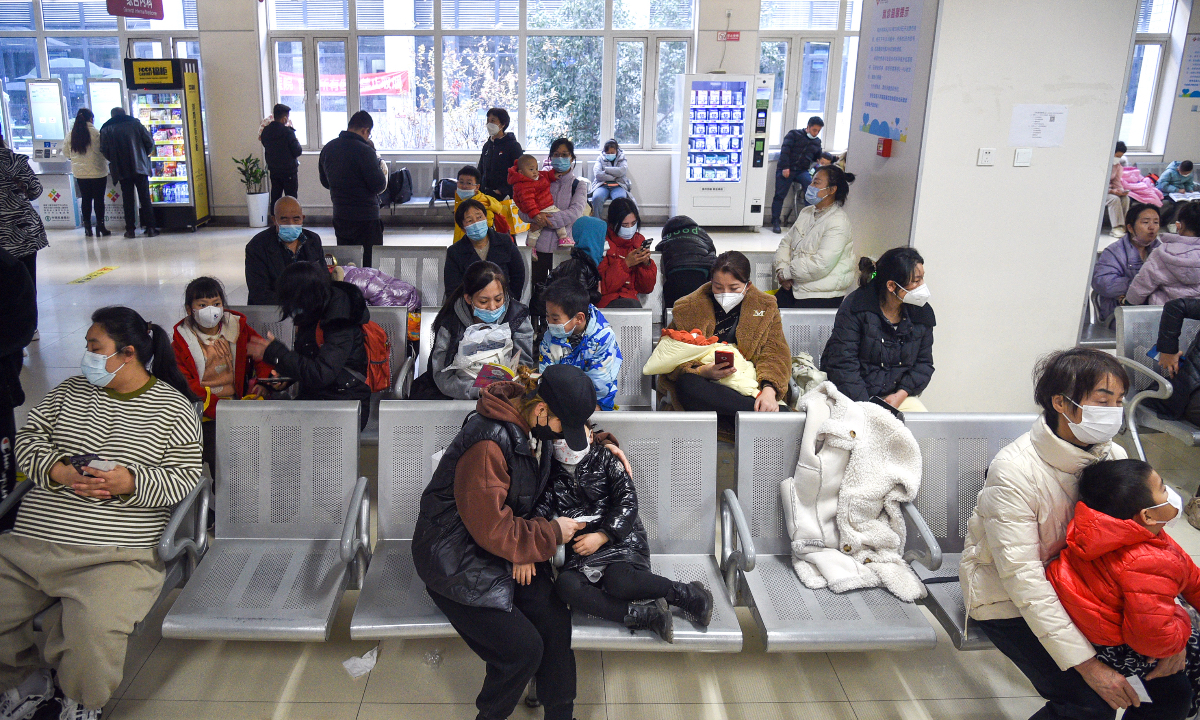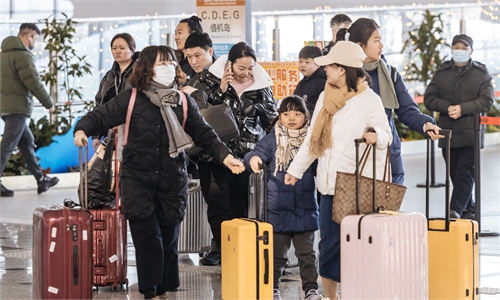COVID-19 epidemic at low level but may rise during Spring Festival: National Health Commission

Parents and their children wait for treatment at the pediatric emergency and laboratory area of a hospital in Xi'an, Northwest China's Shaanxi Province, on December 1, 2023. Photo: IC
The National Health Commission (NHC) on Sunday said that at present, the COVID-19 epidemic is at a low level in China, but recent surveillance data showed positive case reports have increased slightly, suggesting that the epidemic is on the rise. Due to factors such as the inter-regional movement of people and the increase of crowd gathering around the Spring Festival, the number of COVID-19 cases is expected to rise, according to the health authority.
Currently, the JN.1 variant of the COVID-19 virus has become the dominant strain in local cases in China, with mainly mild infections, Chen Cao, a researcher at the Institute of Viral Diseases of Chinese Center for Disease Control and Prevention (China CDC), said at a press conference on Sunday.
Influenza shows a downward trend, but it is still the most important pathogen of respiratory disease infection, and other respiratory diseases are at a low level, according to the press conference.
The press conference revealed that in February, epidemics of multiple respiratory diseases will continue to spread in China. The flu is expected to fall to a low level around the Spring Festival holiday (February 10-17).
Data shows that the situation of acute respiratory diseases in China has declined for two consecutive weeks after reaching a peak in early December 2023. Cases picked up slightly at the end of December, continued to fluctuate at a high level and declined in the past three weeks.
Mi Feng, spokesperson for the NHC, stated that the diagnosis and treatment of respiratory diseases in outpatient and emergency departments of level II medical institutions and above continued to remain stable.
According to Mi, the current situation is due to travel before the Spring Festival, and the domestic North-South cross tourism boom, as well as increasing overseas sightseeing tours. The mass movement and gathering of people makes it easy to accelerate the spread of respiratory diseases, and respiratory diseases will still maintain a certain epidemic level before and after the Spring Festival.
Li Tongzeng, the chief physician of the infection department at Beijing You'an Hospital, told the Global Times on Sunday that in his hospital, influenza B cases still rank as the highest, with COVID-19 ranking second.
Influenza B is still the main type of flu, with a decrease in cases, while the proportion of COVID-19 cases has increased recently, Li noted.
There are also some cases of mycoplasma, adenovirus and respiratory syncytial virus infections. However, there are still patients with fever or other respiratory symptoms who have not tested positive.
During the Spring Festival holiday, many people will be reunited with their families and visit their elderly relatives, which means the infection rate among the elderly may increase, Li warned, calling for the public to look after their families.
He added that currently, a few elderly people still experience more severe symptoms of COVID-19 infections, and there are also individuals who are experiencing their first infection, which increases the risk of developing a moderate to severe illness.
According to the Sunday press conference, the NHC has made special arrangements for epidemic prevention and control work around the Spring Festival. All localities should strengthen duty, maintain emergency preparedness, and coordinate and dispatch medical and health resources and professional forces, the health authority said. It added that localities should ensure the "120" emergency hotline runs smooth 24 hours a day and all medical institutions should do a good first aid transfer.
During the holiday, hospitals and grassroots medical and health institutions should be fully open, with fever clinics, consulting rooms and strong medical forces. Key departments such as emergency, pediatrics and respiratory departments should have smooth green channels and arrange for medical service guarantee during the festival.
Also, the NHC stressed the significance to protect the elderly, children, pregnant women, patients with chronic basic diseases and other vulnerable groups and meet the needs of the people in need of medical treatment and emergency care.
Li told the Global Times that during the Spring Festival, if people experience symptoms such as a fever, cough or sore throat, they should not visit relatives or attend gatherings. Instead, they should immediately rest and avoid long-distance travel.



